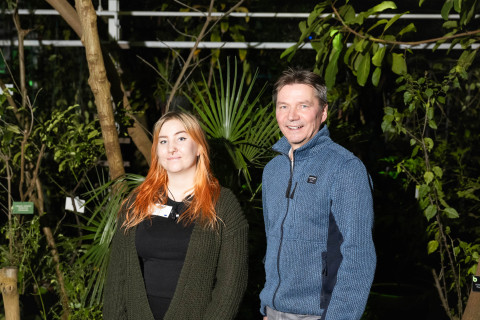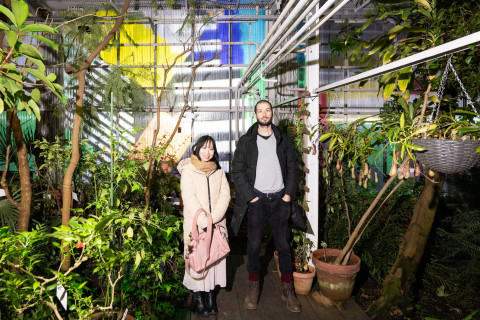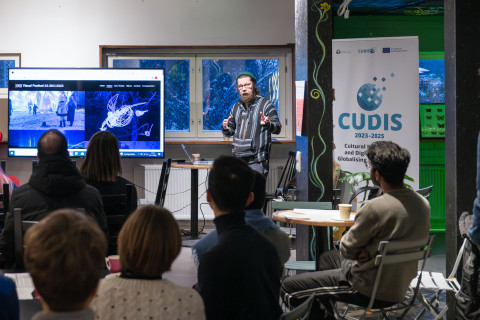The international CUDIS project has identified the driving forces of modern working life.
Cultural skills and digital knowledge are the competitive factors that form the basis for training international employees and experts in North Karelia. During a University of Eastern Finland project to promote the employment of humanities graduates that ended last year, companies sent a clear message: employees who have international expertise, a knowledge of different cultures and digital skills increase vitality in the region.
“These factors are seen as the driving forces of current and future working life. We used this as the foundation for creating the CUDIS project, which was launched last autumn. The project aims to combine the strengths of the humanities and computer science into a single educational entity,” says Project Manager Anna Logrén.
She says that experts in computer science benefit from cultural skills in their work communities, when networking, and during cooperation. Humanities graduates, on the other hand, need more skills related to digitalisation of working life in order to become more efficient in their work and professional skills.

Multicultural teams develop new ways of cooperating
The CUDIS project includes students from several countries. Feedback from international students at the University of Eastern Finland indicates that they would be interested in staying in Finland – and especially Eastern Finland – after their studies. However, it has been difficult to find jobs without networks or a knowledge of the region.
“Our task is to improve employment opportunities by providing direct contacts with working life representatives in the region. We’re also working to ensure that companies have better capabilities and are receptive to recruiting international experts,” explains Project Secretary Oona Järvinen.
With this in mind, the project has created a Digital and international maturity development service in which students and graduate job seekers visit companies in North Karelia to measure their digital and international maturity.
“This gives the companies information on how to develop their business in these areas,” says Logrén.
The project also guides students towards active cooperation with each other. This allows international and Finnish students to form new connections and new types of networks. It also brings different sectors together in a natural manner. Practising in multicultural teams also promotes competence in other ways.
Students are interested in the combination of two very different fields.
“Humanities students have told us that digital skills are becoming increasingly important in their fields, so this type of project has been considered necessary. The students are also very motivated by the idea that the project would allow them to stay and work in Eastern Finland. Hopefully, the networks and cooperation will be helpful,” summarises Järvinen.
Our task is to ensure that companies have better capabilities and are receptive to recruiting international experts.
Oona Järvinen
Project Secretary
Combining culture and technology creates interesting entities
At the end of November, the project organised a Meet & Greet event for its students at Botania Art Garden. The event included an introduction of the project, but the main focus was on speeches made by local entrepreneurs. Producer and photography consultant Rami Saarikorpi and light artist and entrepreneur Kari Kola talked about their companies and how they became entrepreneurs in an international sector.
“The stories told by the entrepreneurs linked culture, technology and entrepreneurship into an interesting package. Their own interests, strengths and the right team were also key elements in terms of success," explains University Lecturer Jukka Mäkisalo.
He says that the students described the speeches as inspiring, and the discussions continued as the group toured the Botania Visual Festival.

High hopes for employment
Students Ha Quynh Anh from Vietnam and Rodion Pozhemetskiy from Russia were both cautiously enthusiastic about the project. They are studying in the Linguistic Data Sciences master’s degree programme at the University of Eastern Finland and hope the project will help them find jobs in Finland.
“Of course, that depends on a lot of things. Joensuu and Finland are calm and safe places in general, and it would be nice to stay here. However, I’ve understood that it can be quite difficult for foreigners to find employment here,” says Quynh Anh.
Pozhemetskiy, who is from St. Petersburg, dreams of having his own enterprise – preferably a café. He has heard that some graduates from this master's programme have already found employment in Finland, so he also has high hopes.
“I hope the project will help me build better networks in the region. Of course, I also need more information about things like loan financing and corporate laws.”
The speeches made by the entrepreneurs at Botania made an impression on Pozhemetskiy.
“The speeches were really inspiring because the speakers were so passionate about entrepreneurship and their own interests.”



